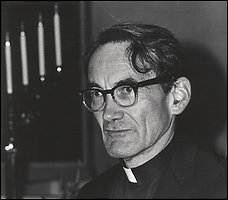By Michelle Boorstein
Washington Post
December 14, 2008
http://www.washingtonpost.com/wp-dyn/content/article/2008/12/13/AR2008121301911.html
[For Dulles' recent positions on the abuse crisis, referenced in this article, see his Rights of Accused Priests. For other Dulles essays, see America's Dulles archive.]
Cardinal Avery Dulles, 90, a former professor at Catholic University who was born into a family of elite Protestant diplomats and became one of the country's most prominent Catholic theologians, died Dec. 12 at an infirmary at Fordham University in New York. Stricken with polio when young, he had post-polio syndrome, which led to progressive muscular and pulmonary deterioration.
Cardinal Dulles, who was appointed to the College of Cardinals by Pope John Paul II in 2001, was the first academic to be named to the Catholic Church's highest advisory council, as well as the first who had never served as a bishop.
Cardinal Dulles, a very tall and thin figure, was known for his unusual spiritual journey and came to be considered a calm statesman of Catholicism during a time of great turmoil.
 |
| Avery Dulles was named to the College of Cardinals by Pope John Paul II |
Through more than 20 books and 800 articles, he articulated a conservative if tolerant case for Catholicism and the church's positions on contraception, sexuality, the role of women and clergy sex abuse. He served as a bridge between the Vatican and the more liberal American Catholic dissidents after the Second Vatican Council of the 1960s. In his later years, he was seen more as an advocate of orthodoxy and said church sanctions against priests charged in sex abuse scandals were too extreme.
He was the son of former secretary of state John Foster Dulles, who served under President Dwight D. Eisenhower. His uncle, Allen Dulles, was CIA director from 1953 to 1961.
Cardinal Dulles wrote and spoke often of his conversion to Catholicism, a faith still looked at skeptically by many Protestants in 1940, when he joined the church. Among the skeptics was his father, who was initially embarrassed about his son's religious path but later reconciled with him.
Avery Robert Dulles was born Aug. 24, 1918, in Auburn, N.Y., and grew up in a patrician Presbyterian family. His grandfather was a Presbyterian minister, and a great-grandfather and great-uncle had both served as secretaries of state.
Cardinal Dulles, who wrote about his spiritual journey in his autobiographical "A Testimonial to Grace" (1946), considered himself an agnostic when he entered Harvard College in the 1930s. He was drawn to Catholicism by his readings of the poet Dante Alighieri and the Catholic philosopher Saint Thomas Aquinas. The concept of objective moral standards appealed to him, but his spiritual quest was crystallized during a walk in Cambridge, Mass., when he looked at nature and began to see a governing purpose to the world.
"It was a matter of becoming aware of this reality behind everything that existed," he said in a 2001 interview in the New York Times Magazine. "That evening when I got back to my room, I think I prayed for the first time."
After graduating from Harvard in 1940, he served in the Navy during World War II and attended Harvard Law School for a few semesters before entering the Society of Jesus in 1946. He was ordained a Jesuit priest in 1956.
He received a doctorate in theology in 1960 from the Pontifical Gregorian University in Rome and taught at Woodstock College, a now-closed seminary in Maryland, from 1960 to 1974. He was a theology professor at Catholic University from 1974 to 1988.
He wrote and lectured on many topics relating to Catholicism, with a specialty in ecclesiology, or the mission of the church in the world. Through his teaching and writing, Cardinal Dulles became "the United States' preeminent theologian," Washington Archbishop Donald Wuerl said in a statement.
Cardinal Dulles was at Catholic University when the Vatican disciplined many theologians who publicly disagreed with church authorities on a host of issues, including contraception, premarital sex, abortion, homosexuality and euthanasia. Cardinal Dulles sat on a faculty committee that defied the Vatican by recommending against the removal of a dissident theologian, but he did not speak out publicly against the church.
He said that he was opposed to the punishment of dissidents but that he could not support theologians and priests who routinely went against the church's teachings. His goal was to unify Catholics, he wrote, and to be a liaison between the Vatican and more free-thinking theologians.
After retiring from Catholic University, Cardinal Dulles joined the faculty at Fordham University, where he taught until last year. He served as president of the Catholic Theological Society of America and the American Theological Society in the 1970s and was also a member of the International Theological Commission, the U.S. Lutheran-Roman Catholic Dialogue and a consultant to the U.S. Conference of Catholic Bishops' Committee on Doctrine.
He had no immediate survivors.
Any original material on these pages is copyright © BishopAccountability.org 2004. Reproduce freely with attribution.